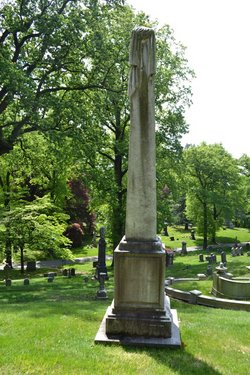Robert Selden Garnett
Robert S. Garnett was born in Essex County, Virginia in 1819. Robert graduated from the United States Military Academy in 1841 ranked 27th out of 52 cadets. Despite his lower ranking, he was placed in the artillery. Most graduates ranked outside the top ten ended up in the infantry. Garnett did eventually become an infantry officer where he served during the Mexican War. Twice he was praised for his bravery there. Robert was the first cousin of Richard Brooke Garnett who would also become a Confederate brigadier general and would lose his life at Gettysburg.
Prior to the Civil War, Robert would see more action against the Native Americans of Puget Sound. In 1857, he married Marianne Nelson and a year later they had a son named Arthur Nelson Garnett. Both Marianne and Arthur would come down with what was then termed "bilious fever" and both died. Marianne was from New York and both were laid to rest in Green-Wood Cemetery in Brooklyn, New York. Marianne was twenty-six years old. Arthur was seven months old and outlived his mother by six days.
Marianne Garnett
When the Civil War began, Garnett was made a brigadier general and sent to western Virginia where he was given command of green troops, poorly armed, and heavily outnumbered. Before leaving Richmond, Virginia for his command, Garnett had told a friend, "They have not given me an adequate force. I can do nothing. They have sent me to my death."
Upon arriving at his command, he attempted to extricate them from the mountains and back to the Shenandoah Valley. The Federals under McClellan were pursuing the Confederate force. Garnett personally managed his rearguard during the retreat. Rains had turned the roads into a mess. Upon reaching a place called Corrick's Ford on the Cheat River, Garnett attempted to fight another rearguard action here to delay his pursuers. He placed the 23rd Virginia Infantry on the shore under future Brigadier General William B. Taliaferro.
The Federals arrived and were repulsed two times by Taliaferro's regiment. Garnett was recommending a position to place skirmishers when several Federal soldier's opened fire. Garnett's aide Sam Gaines was mounted at his side and ducked the shots. Garnett scolded his assistant for dodging bullets. During the war, commanding officer's had to inspire their soldiers by standing bravely while bullets passed close by. Gaines apologized saying he felt the wind of the bullet and it caused him to flinch. Garnett quickly changed his tone and spoke compassionately to Gaines about how an officer should act in combat.
Corrick's Ford
The Federals quickly closed to within fifty yards of Garnett's position. He ordered his skirmishers to fall back as a bullet struck him in the back. He fell from the saddle and Gaines attempted to pick him up and place him back on his horse. About to be captured, he climbed into the saddle and galloped away, leaving Garnett to the mercy of the Federals. He died a few moments later. Some reports stated that his body actually fell off the horse into the Cheat River. One Federal soldier reported finding Garnett just moments before he died and hearing the general say that he believed he'd been accidentally killed by friendly fire.
General McClellan praised the gallant conduct of Garnett in this action and had his body placed on ice and sent through Confederate lines to be given to his family for a descent burial. Ironically, his body would pass back through Federal lines where he would temporarily be buried in Green Mount Cemetery in Baltimore, Maryland. Just after the war, he was reinterred beside his wife and son in Green-Wood Cemetery in Brooklyn, New York. Robert Selden Garnett was 41 years old. Had he not been killed there is little doubt that he would have attained higher rank because General Robert E. Lee had great confidence in Garnett's ability. He may have become one of Lee's best corps commander's had he lived. We will never know.

Obelisk over the grave of Garnett, his wife, and son









